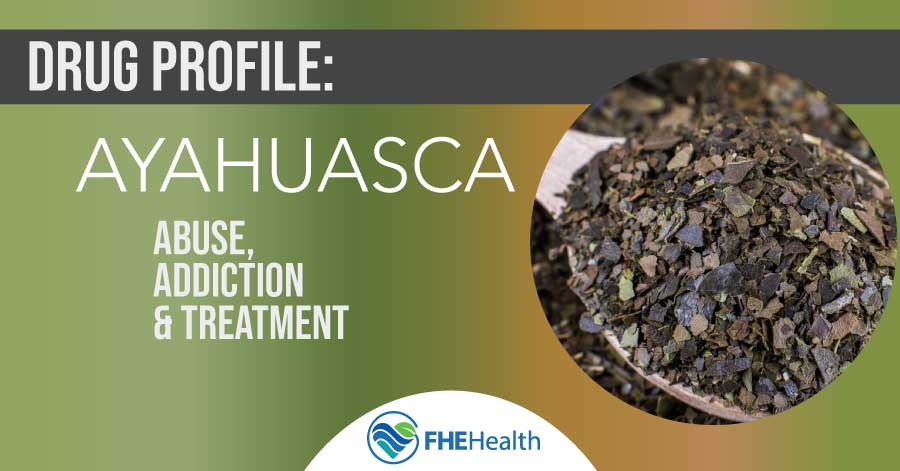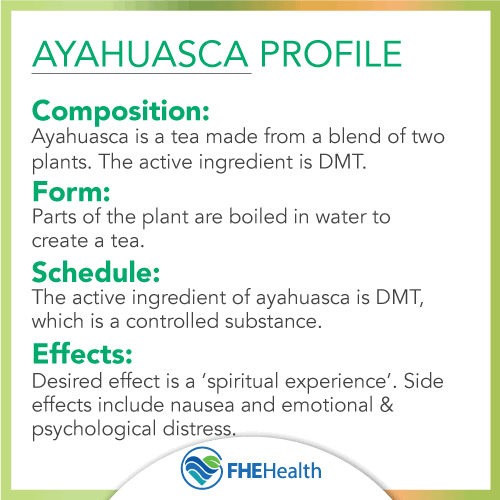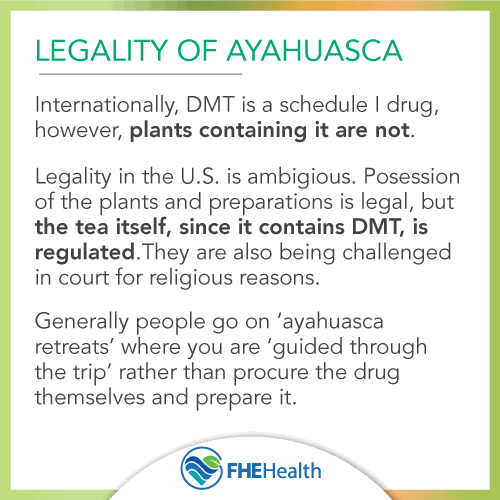
The indigenous people of the Amazon basin traditionally consumed ayahuasca, a psychedelic drug, as medicine in spiritual ayahuasca ceremonies. The drug has several different names throughout Brazil and the northern part of South America, including “ayawaska,” “caapi,” “cipo,” “natem” and “shori.” The first known use dates back to 1000 C.E. based on a discovery of ayahuasca residue in a Bolivian cave. Christian missionaries who encountered users in the Amazonian basin considered the drug the work of the devil.
Though ayahuasca is an uncontrolled substance, dimethyltryptamine (DMT) extracted from the plant has a Schedule I drug classification, according to the Controlled Substances Act. Knowledge of ayahuasca usage increased after the McKenna brothers published their book True Hallucinations, detailing their Amazonian experience.
What is Ayahuasca?
 Ayahuasca is a plant-based, psychedelic tea used to make people hear, see, smell, taste and feel things that do not exist. The drug creates a completely different experience from reality. Its main active ingredient is “Psychotria Viridis,” which contains DMT.
Ayahuasca is a plant-based, psychedelic tea used to make people hear, see, smell, taste and feel things that do not exist. The drug creates a completely different experience from reality. Its main active ingredient is “Psychotria Viridis,” which contains DMT.
With a distinctively strong smell and taste, Ayahuasca brew has a brownish-red color with a bitter taste. The tea results from several hours of brewing a combination of “Psychotria viridis” and “Banisteriopsis caapi” to develop its psychedelic abilities. The effects start approximately 30 minutes after you drink Ayahuasca and can go on for several hours.
In the 1980s, Ayahuasca preparations became known by over 70 different names, demonstrating just how widespread their use is.
What is Ayahuasca Used for?
Traditional healers in the Amazonian basin have used Ayahuasca for centuries as a medicine and in spiritual ceremonies. Recently, more countries have developed an interest in the therapeutic healing benefits of using it to overcome dependencies related to other psychoactive drugs and alcohol.
Ayahuasca consumption causes mind alteration as brain waves start to change, and is also associated with reductions in respiratory rates, blood pressure, and metabolism.
How to Take Ayahuasca?
Ayahuasca is traditionally consumed as a brew in religious and spiritual ceremonies. This plant tea is brewed and given to users in a ceremony guided by a respected shaman or spiritual leader— the idea being that users will find inner healing, experience a deeper connection to a higher power and/or be better able to confront and overcome their fears. Many users have reported that using ayahuasca just once helped to cure issues like depression and drug dependence. Ayahuasca retreats and ceremonies are legal in the Amazon but they are still not legal in the U.S.
What are the Side Effects of Ayahuasca?
 Ayahuasca can affect everyone differently, depending on a number of factors like height, weight, health, amount of drugs consumed, strength and much more. You may experience side effects like:
Ayahuasca can affect everyone differently, depending on a number of factors like height, weight, health, amount of drugs consumed, strength and much more. You may experience side effects like:
- Nausea
- Vomiting and diarrhea
- Profuse sweating
- Paranoia and fear
- Euphoria
- Increase in heart rate and blood pressure
- Visual stimulation
- Increased anxiety and body temperature
In a few cases, deaths have occurred after consuming ayahuasca. People who experience ongoing nausea, extreme intoxication, feelings of panic, breathing difficulties, heart rate variations, shivering, lethargy, sweating, and psychosis should seek medical help to prevent any major repercussions.
The effects of long-term ayahuasca use are still being researched. Early indicators reveal no significant losses to long-term cognitive functioning. Still, anyone with a mental health condition should avoid ayahuasca, because the drug can intensify feelings of paranoia and anxiety— and, because its effects can differ widely between batches and are therefore unpredictable.
Is Ayahuasca Legal?
 There are complications surrounding the legal use of Ayahuasca in the U.S. While there’s no specific legality covering the overall use of Ayahuasca, it does contain the prohibited drug DMT, which is considered illegal.
There are complications surrounding the legal use of Ayahuasca in the U.S. While there’s no specific legality covering the overall use of Ayahuasca, it does contain the prohibited drug DMT, which is considered illegal.
Two religious groups—the Santo Daime and the UDV—have approval to use ayahuasca in spiritual and healing ceremonies. For those who want to use ayahuasca legally, joining these churches is the only option. But it’s also important to note that both groups focus on abstinence and are not for casual or recreational users. The court ruling to allow ayahuasca use in both these groups has had massive implications, with the possibility of other countries following suit.
“Harmaline” and “DMT” are the most psychoactive components in ayahuasca. Both these substances are schedule II drugs in Canada with imprisonment of up to three years for those caught using it. This essentially means that ayahuasca is completely illegal in Canada. There are no religious exemptions in the country.
In many countries, ayahuasca brew is treated as a sacred preparation and doesn’t have the same restrictions as DMT has on its own. But a lot of ambiguity still remains with instances of people being arrested for spiritual use as well. The use of ayahuasca is legal in Peru and Brazil for retreats.
What is Ayahuasca Association With Addiction?
Research studies conducted worldwide have indicated that ayahuasca use doesn’t necessarily lead to addiction, and there is limited dependence on it.
According to one study, ayahuasca users were less likely to become addicted to drugs and alcohol than others. Another study analyzed ayahuasca’s antidepressant effects. 29 patients suffering from depression consumed ayahuasca or a placebo. The depression score changes were then analyzed and revealed that those who consumed ayahuasca had lower depression scores compared to those who took the placebo.
But it’s also important to understand that ayahuasca use isn’t something to be treated lightly. Ayahuasca is known to affect both monoamine and serotonin levels and can cause dangerous reactions when consumed with other drugs, medicines or alcohol, which is why it can be dangerous to take on your own. It can also cause severe reactions when combined with dairy and caffeine food products. Brain scans have shown that using this tea decreases brain activity in certain areas that cause anxiety and stress. But sometimes, an alternative effect can occur that heightens activity as well.
If you or a loved one is suffering from any form of drug addiction, we encourage you to ask for help. FHE Health is committed to helping you get your life back on track, by providing you with a treatment program that suits your individual needs. Call us at (833) 596-3502. Our counselors are available 24/7 to help you get on the path to lasting recovery.






